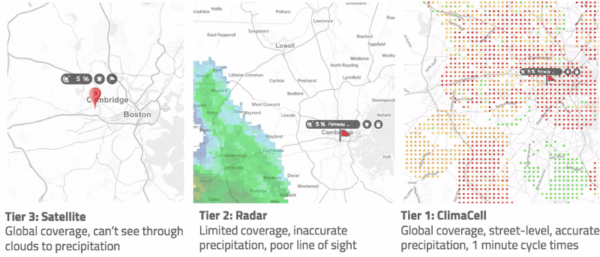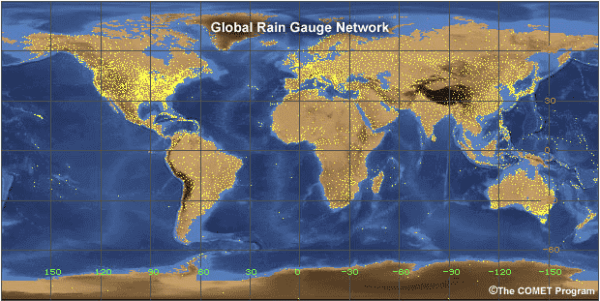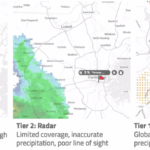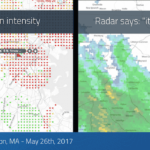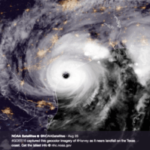TLDR;
- Advanced weather forecasting enhances planning and scheduling for construction project managers
- Automated decision-making reduces errors and improves efficiency across construction projects
- AI-backed, real-time adaptation strategies minimize delays and optimize resources for construction
- Predicted weather impacts allow for proactive project management and is already making changes for companies like Walbridge
- Weather intelligence from Tomorrow.io leads to cost savings and safety improvements.
Weather plays a pivotal role in shaping construction project timelines, safety protocols, and overall operational efficiency. Advanced weather intelligence technologies has opened new horizons for construction businesses, enabling them to anticipate and adapt to meteorological changes more effectively than ever before.
This article, the first in a three part series, delves into how construction managers, project planners, site engineers, risk managers, and scheduling coordinators can harness the power of weather forecasting and dynamic response strategies to minimize delays, optimize schedules, and ensure project success.
We will explore the critical importance of integrating accurate weather forecasts into project planning, the benefits of automated decision-making in weather response, and how predicted operational impacts can transform project management in the construction industry.
The Importance of Weather Forecasting in Construction
Weather forecasting has always been a crucial element in construction project planning, but with today’s advanced technologies, its role has become more critical and impactful. Research indicates that 45% of construction projects globally face delays each year due to adverse weather, leading to billions of dollars in additional expenses and lost revenue. Precise and timely weather forecasts allow construction managers to make informed decisions that can significantly influence both the start dates and the ongoing schedules of construction projects.
Weather intelligence in construction operations has allowed weather forecasts to be a tool for weather thresholds. These platforms provide forecasts and insights into how weather conditions might impact specific construction activities, enabling more effective planning and scheduling.
With centralized rules and protocols, including automated responses to adverse weather conditions such as lightning strikes, project managers can now ensure that projects progress safely and without unnecessary interruptions. This technological leap forward minimizes downtime and protects crews, translating into direct savings and increased project predictability. Moreover, the automation of weather-related decision-making processes reduces the likelihood of human error, thereby enhancing overall operational efficiency.
Dynamic Weather Response Strategies
In the construction industry, the ability to quickly respond to changing weather conditions is not just a convenience; it’s a necessity for maintaining schedules, ensuring safety, and controlling costs. Dynamic weather response strategies, powered by advanced weather intelligence, provide construction businesses with this critical capability. By harnessing real-time data and predictive analytics, these strategies allow for an agile approach to project management, where decisions are informed by the most current weather forecasts.
Real-Time Adaptation to Weather Changes
The core of dynamic weather response strategies lies in their capacity for real-time adaptation. With access to immediate weather updates, construction managers can make on-the-spot decisions to rearrange work schedules, shift resources, or pause operations to ensure safety and efficiency. This agility helps in avoiding potential weather-related setbacks, such as unsafe working conditions or the risk of damaging materials.
Automated Alerts and Decision Making
Automated weather alerts are a key feature of modern weather intelligence systems, providing timely warnings about impending adverse conditions like high winds, heavy rainfall, or lightning. These alerts can be customized to the specific thresholds relevant to each construction project, ensuring that managers and crews are always prepared. Furthermore, the automation of decision-making processes—such as the initiation of safety protocols or the rescheduling of deliveries—helps to reduce the cognitive load on project managers.
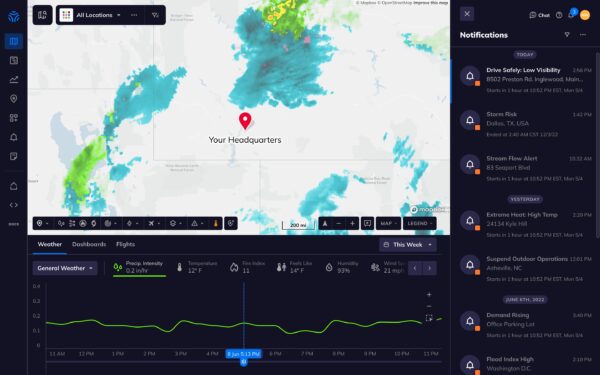
Leveraging Weather Data for Operational Efficiency
The strategic use of weather data extends beyond mere risk mitigation. By analyzing weather trends and forecasts, construction businesses can identify opportune moments for conducting certain operations. For instance, knowing a clear weather window allows for scheduling tasks that require dry conditions, maximizing productivity and keeping the project on track.
Predicted Operational Impact
The ability to predict the operational impact of weather conditions offers a strategic advantage in construction project management. By anticipating weather disruptions, construction managers can devise contingency plans, allocate resources more efficiently, and adjust project timelines proactively. This foresight helps in minimizing the financial and temporal costs associated with weather-induced delays.
Furthermore, predicted operational impacts are not solely about mitigating negative effects; they also enable the identification of opportunities. For example, knowing in advance about a period of unusually mild weather could allow for the scheduling of work that would otherwise be postponed due to typically adverse conditions for that time of year.
This proactive approach to project management, powered by advanced weather intelligence, enhances the overall resilience and efficiency of construction operations.
Case Studies and Real-World Applications
To illustrate the practical benefits and effectiveness of weather-adaptive project management strategies in construction, let’s explore a few case studies and real-world applications that showcase how businesses have successfully integrated advanced weather forecasting and dynamic response systems into their operations.
Major Infrastructure Project
A large-scale infrastructure project in a region prone to sudden weather changes implemented a weather intelligence platform that provided real-time data and forecasts. By setting up automated alerts for lightning, high winds, and heavy rainfall, the project managers were able to plan work schedules more effectively, reducing downtime by 20%. Automated decision-making protocols led to preemptive rescheduling of concrete pours and crane operations, avoiding delays and ensuring worker safety.
Weather Insights for Walbridge Construction
Construction companies, like Walbridge, are already using weather intelligence for their construction management needs. Walbridge projects across the country identify incoming hazardous conditions better by utilizing an advanced software weather intelligence and climate adaptation platform.
With Tomorrow.io, Walbridge is able to mitigate severe weather impact. The technology provides excellent insights to best prepare for safety measures and operational impact.
“Tomorrow.io allows Walbridge jobsites to mitigate and minimize weather impact, which helps us maintain our cost and schedule,” Walbridge Senior Vice President Eric Twigg said. “Tomorrow.io synthesizes all the weather information. It makes automated decisions on what and when a weather alert goes out, and we program what the alert is and what triggers it.”
To sum things up;
The integration of advanced weather forecasting and dynamic response strategies into construction project management represents a paradigm shift in how the industry addresses the challenges posed by weather. By leveraging real-time data, automated decision-making, and predictive operational insights, construction businesses can significantly minimize downtime, optimize schedules, and enhance worker safety.
The case studies presented underscore the tangible benefits of adopting weather intelligence technologies, from improved operational efficiency and reduced costs to increased safety and project predictability.
In the next article, we will focus on enhancing construction site safety through advanced weather preparedness and monitoring. Building on the foundation of weather-adaptive project management, we’ll explore specific strategies and technologies that further protect construction crews and sites from adverse weather conditions, ensuring a safer and more efficient construction environment.


